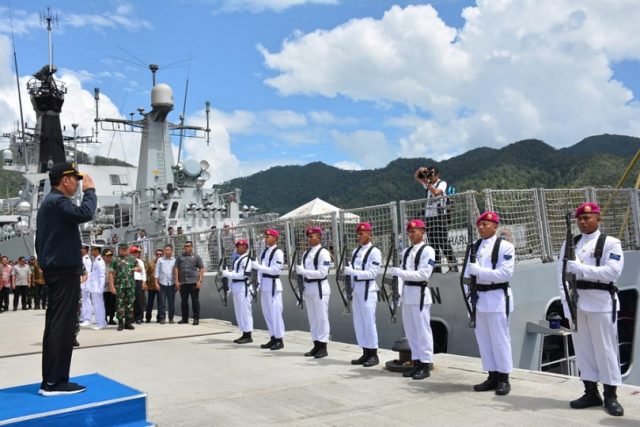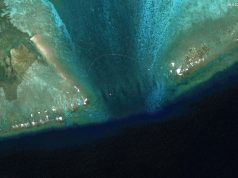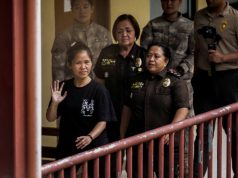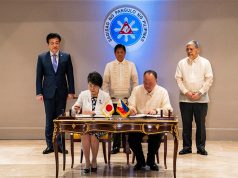
Following the recent standoff between China and Indonesia, some Filipinos raised comparisons on Indonesia’s stance compared to President Rodrigo Duterte’s leniency in asserting the country’s sovereignty.
Chinese vessels were previously encroaching on the vicinity of the Natuna Islands in the South China Sea, which was within Indonesia’s exclusive economic zone.
Recent reports stated that Indonesia was able to drive away the Chinese ships which were suspected of conducting illegal activities in the islands.
These developments reached local social media, earning praises from some Filipinos online.
"There is no compromise when it comes to our nation's territorial sovereignty."
– JOKO WIDODO, President of the Republic of Indonesia, responding to Chinese encroachment into Indonesian territory near Natuna Islands#IndonesiaRaya #JalesvevaJayamahe #SanaAll 💪 🇮🇩 🏝️ pic.twitter.com/DTAVn90Yt1— BrujaDeputaAdmlnisTraitor (@BrujaDelDemonio) January 8, 2020

Twitter page @IndoPac_Info also noted the difference in responses of Indonesia and Philippines to the Chinese coast guard.
“While Indonesia fights back against Chinese coast guard intrusions in its waters, the Philippines rolls out the red carpet for the visiting Chinese coast guard, the same ones that occupy much of their EEZ and are trying to take more (Reed Bank), the tweet read.
The sheep and the lion
While #Indonesia fights back against #Chinese coast guard intrusions in its waters, the #Philippines rolls out the red carpet for the visiting #Chinese coast guard, the same ones that occupy much of their EEZ & are trying to take more (Reed Bank)😲🧐🤔😲 pic.twitter.com/bjcXniLSQq
— IndoPacific News (@IndoPac_Info) January 15, 2020
The tweet was referring to the warm welcome of the Philippine Coast Guard to its Chinese counterpart last January 15.
At the same time, another Chinese Coast Guard ship was found monitoring near the Ayungin or Second Thomas Shoal in the West Philippine Sea, where Filipino troops were stationed that time.
Indonesia’s actions against Chinese vessels
Indonesia made the following activities to reinforce its sovereignty against Chinese incursions.
Indonesia first lodged a diplomatic protest against China early this January, citing the July 2016 arbitral ruling in favor of the Philippines’ claims in the South China Sea.
The waters around Natuna islands overlapped with China’s so-called nine-dash line, which the landmark decision invalidated.
The United Nations Convention on the Law of the Sea (UNCLOS) also stated that Indonesia has sovereign rights to the resources within its EEZ or up to 200 nautical miles from an inhabited territory, similar to the Philippines.
Second, Indonesia sent 120 of its own fishermen to operate in the Natuna waters.
Mahfud MD, Indonesia’s Coordinating Political, Legal and Security Affairs Minister, assured the fishermen that they will be protected while they exercise their rights over the waters.
“You will, in addition to exercising your rights as citizens, also make good on your duty to help defend the country, to show that these waters are ours. The important thing is that you are comfortable there. The state will oversee your activities there,” he said in Jakarta Post.
Indonesia then deployed fighter jets and warships to patrol the islands. This was confirmed by Indonesia spokesman Fajar Tri Rohadi.
Around 600 personnel from the Indonesian army, navy and air force were also earlier deployed to conduct patrolling.
The final step was the visit of Indonesian President Joko Widodo himself to Natuna Islands.
A report from Jakarta Post stated that Widodo went there to handover land certificates to the locals and to meet the hundreds of fishermen who live there.
Controversial Chinese consortium
Last month, a Chinese infrastructure giant which was previously banned from the World Bank due to fraudulent practices got the Sangley airport project worth P500 billion.
The consortium comprising China Communications Construction Co. Ltd. (CCCC) and tycoon Lucio Tan’s MacroAsia Corp. was the lone bidder for the Cavite government’s infrastructure plan of building the Sangley Point International Airport.
The World Bank banned CCCC, which was one of the biggest companies in the world, from 2011 to 2017.









